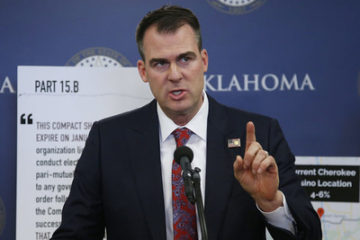
In a letter to state tribes, Oklahoma Governor Kevin Stitt proposed a deal to end the standoff about gaming compacts. The compacts expired on December 31, 2019, and Stitt wants them renegotiated. The tribes claim the compacts renewed automatically, setting up this showdown.
Stitt asked for 5 percent of gross gaming revenues. Last year the tribes paid between 4 percent and 6 percent, netting the state $150 million. The letter also proposes the legalization of sports betting, with the state taking 2 percent of the gross revenue. But the state also wants approval of casino vendors and a rule that requires the tribes to include a certain number of Class III games on their floors. Class II games are not taxable under federal regulations.
The tribes reacted badly to the letter, and claimed the governor was using the coronavirus pandemic as leverage.
“We are disappointed in the action taken by Governor Stitt through one of his attorneys to take advantage of tribes as they focus on protecting their tribal citizens and non-tribal citizens during this pandemic,” said Oklahoma Indian Gaming Association Chairman Matthew L. Morgan in a statement. “Since July we have made it clear that we are open to renegotiating rates as outlined in Part 11 of the compacts. Any party may request to renegotiate rates and exclusivity. Governor Stitt, however, has steadfastly rejected that framework, dismissed the tribal position, insisting on tossing overboard an intergovernmental agreement that has worked well for all Oklahomans.
“This letter is yet another unsuccessful attempt to divide the tribes. The letter confirms the real intent of Governor Stitt is to destroy the tribal interest outlined in the existing compacts. The tribal leaders who received the letter reject the proposal as disrespectful and disingenuous.
“Perhaps more than anything, though, we are dismayed Governor Stitt would exploit the current pandemic for these purposes. Consistent with the advice of public health professionals, the tribal governments have suspended gaming operations to help blunt the spread of COVID-19. Nothing is more important to the Tribes than working together to fight this deadly virus. Public health is our main focus at this time.”
Meanwhile, Chief U.S. District Judge Timothy DeGiusti recently extended the filing deadline by two months and postponed a hearing indefinitely due to the coronavirus. DeGiusti also delayed a conference to review the case’s status and scheduling that had been set for April 3. And extended the deadline for mediation from March 31 to May 31.
Three Oklahoma tribes sued Stitt on December 31, asking for a declaration that their 15-year gaming compacts automatically renewed January 1. Stitt argued the compacts expired January 1 and gaming taking place at the tribes’ casinos is illegal. Stitt has said he wants to renegotiate the compacts to raise exclusivity rates from the current 4 percent to 6 percent graduated rate tribes pay for Class III gaming machines and 10 percent rate they on table games.
The Cherokee, Chickasaw and Choctaw nations filed the lawsuit, and since have been joined by the Muscogee (Creek) Nation and others. That list includes the Wichita and Affiliated Tribes which recently filed another suit in federal court claiming the state reneged on its exclusivity agreement by allowing the state lottery to let players participate in online second-chance promotions. As a result, the tribe said it is no longer legally obligated to share a portion of gaming revenue with the state and is entitled to damages from the state for violating the gaming compact.
Wichita Tribes President Terri Parton said, “Even if the Lottery Commission didn’t expand its online operations, this new form of electronic gaming not only violates the exclusivity guaranteed to tribal gaming operations under the tribal-state gaming compacts, but likely violates federal laws controlling gaming in Indian country.
“The Lottery Commission’s plans threaten gaming operations and the educational funding they provide for the state, Our support for education has not wavered but if violations of our compact continue, we may have no choice but to redirect our payments to the local schools near us. At least then we will know the money will make it to the classroom where our children and our neighbors’ children need it most.”



